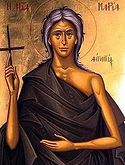

| Previous day | Next day |
| Old Style
April 1
|
Sunday |
New Style
April 14
|
|
Fifth Sunday of Great Lent. Commemoration of St. Mary of Egypt.
Tone 5.
Great Lent. |
Wine and oil allowed.
|
![]() St. Mary of Egypt (522).
St. Mary of Egypt (522). ![]() St. Euthymius the Wonderworker, archimandrite, of Suzdal (1404). St. Barsanuphius of Optina Monastery (1913).
St. Euthymius the Wonderworker, archimandrite, of Suzdal (1404). St. Barsanuphius of Optina Monastery (1913).
Martyrs Gerontius and Basilides (3rd c.). St. Macarius, abbot, of Pelecete (ca. 830). Martyr Abraham of the Bulgars on the Volga (1229). St. Gerontius, canonarch of the Kiev Caves (14th c.). St. Pachomius, archbishop of Roman and Galati (Moldavia) and monk of the Kiev Caves (1724).
New Hieromartyr Sergius Zavarin, archpriest, of Yaroslavl (1938). New Hiero-confessor Schema-bishop Macarius (Vasiliev), at the Pskov Caves Monastery (1944).
St. Meliton, bishop of Sardis (177). Martyr Romanus of Raqqa (Syria) (780). St. Procopius, abbot, of Sazava in Bohemia (1053). Sts. John of Shavta, bishop of Gaenati (7th c.-13th c.) and Eulogius the Prophet, fool-for-Christ (13th c.). of Georgia.
Thoughts for Each Day of the Year
According to the Daily Church Readings from the Word of God
By St. Theophan the Recluse

The Fifth Sunday of Lent. [Heb. 9:11–14; Mark 10:32–45]
The sinful woman, upon hearing that the Saviour was in the house of Simon, came there with an alabaster box of ointment. Moving toward the feet of the Lord from behind Him, she started to cry and washed His feet with her tears, then wiped them with her hair, kissed them and anointed them with myrrh (cf. Luke 7:36–39). She did not say anything; she only acted, and through her actions revealed a most tender love for the Lord. Because of this it was spoken of her: Her sins, which are many, are forgiven; for she loved much (Luke 7:47). Oh, when will we talk less and act more, and through our actions witness our love for the Lord? You might say, “If He were here I would be ready now to do all for Him.” But He is here, invisible in His person, but visible in all Christians, most of all in the needy. Anoint the invisible Lord with loving prayer of the heart and mind; and, for His sake, do everything possible for the needy, and you will be doing this for God.
Articles
 Venerable Euthymius of SuzdalThe ascetic struggles of Saint Euthymius were so great that Saint Dionysius advised him to lessen them. |
 Venerable Barsanuphius of Optina |
 Martyrs Gerontius and BasilidesThe Martyrs Gerontius and Basilides suffered martyrdom for Christ in the third century. |
 Venerable Macarius the Abbot of PeleceteSaint Macarius was born at Constantinople in 785. While still a child, he lost his parents. |
 Martyr Abraham of BulgariaThe Holy Martyr Abraham the Bulgar, Vladimir Wonderworker, lived during the thirteenth century, and was descended from the Kamska Bulgars and brought up as a Moslem. |
 Venerable Gerontius the Canonarch of the Kiev Far CavesHe spent all his life at the monastery, in ascetic deeds of abstinence, obedience, and prayer. |







